
Lit Hub's Most Anticipated Books of 2019
What We're Looking Forward to, the First Half and Then Some
MARCH
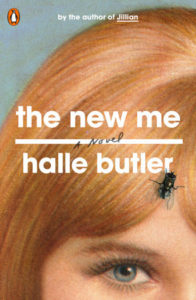 Halle Butler, The New Me
Halle Butler, The New Me
Penguin Books, March 5
Catherine Lacey described the second novel from Halle Butler—whose debut, Jillian, was a thrilling, hilarious, hostile affair—as “a dark comedy of female rage.” It stars Millie, who is just the kind of misanthropic, hopeful/doomed thirty-year-old we’ve all known, and/or been, and/or loved, and/or hated. Butler is an essential contemporary voice; can’t wait for this one. (ET)
 Kathryn Davis, The Silk Road
Kathryn Davis, The Silk Road
Graywolf, March 5
Kathryn Davis is one of our finest and strangest writers; her most recent novel may be her strangest—and at the very least her most allegorical—yet. It concerns eight siblings: the Astronomer, the Archivist, the Botanist, the Keeper, the Topologist, the Geographer, the Iceman, and the Cook, who are all, when the novel opens, taking a yoga class at the end of the world. When corpse pose, for one of them, becomes permanent, they all begin to muse on their childhoods, both shared and private. Eat your expectations for this one; you never know where Davis will take you. (ET)
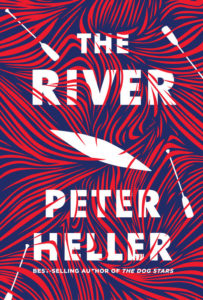 Peter Heller, The River
Peter Heller, The River
Knopf, March 5
Bestselling author of The Dog Stars Peter Heller’s latest is a literary thriller about friendship: two college friends decide to canoe down Canada’s Maskwa river. All well and good and relaxing, but then they overhear a man and a woman arguing, and when they later find the woman beaten nearly to death and make the mistake of radioing her husband, they find themselves on the run from a dangerous foe—which is not even counting the wildfire on their heels. (ET)
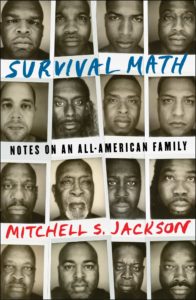 Mitchell S. Jackson, Survival Math: Notes on an All-American Family
Mitchell S. Jackson, Survival Math: Notes on an All-American Family
Scribner, March 5
Taking its title from the calculations the author and his family had to make to stay alive and safe every day, Survival Math—Whiting Award recipient Mitchell Jackson’s follow-up to his brilliant 2013 novel, The Residue Years—is a powerful, vital portrait of Jackson’s youth in a Portland neighborhood blighted by drugs, violence, and governmental neglect, as well as a thrilling and lyrical redemption memoir. (DS)
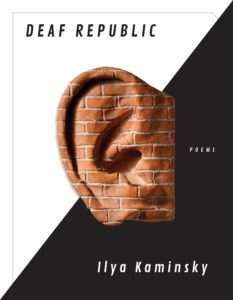 Ilya Kaminsky, Deaf Republic: Poems
Ilya Kaminsky, Deaf Republic: Poems
Graywolf, March 5
In the poetry world Kaminsky’s second book has been a wondered about second-act on par to Marilynne Robinson’s Gilead. Why? The Ukrainian-born Kaminsky is a kind of walking IMDB of poetry, libraries of the world’s verse and all their music live inside him. In part because since the age of 4 Kaminsky has been without a lot of his hearing. “Dancing in Odessa,” his 2004 debut, channeled this erudition into his own poetry, but in “Deaf Republic” Kaminsky truly emerges and its a glorious thing to behold. Poem by poem he turns lack of hearing into both metaphor and meaning. Using italics and short lines, unexpected stanza breaks and recurring images, Kaminsky evokes the sonic solitude of deafness: the way words exist inside his head more than outside of it. Alternating between love and poems and dirges, he also brings to life the state of siege a lot of the world has lived under in the past century and builds a poetic nation out of imagined dispatches. Where we when the bombs our taxes paid for fell? When the 4 am bunker busters woke the canaries in darkly-lit backyards. These poems ask us to please wake from our silence. (JF)
 John Lanchester, The Wall
John Lanchester, The Wall
W. W. Norton, March 5
John Lanchester’s debut, A Debt to Pleasure, is a pure, ecstatic delight, but he hasn’t gotten as much attention as he deserves, especially on this side of the pond. His latest book is a timely dystopian novel in which an island nation (could it be Britain, in the near future?) has surrounded itself with an enormous concrete wall—the National Coastal Defense Structure—to keep out the Others, who are trapped in the rising waters outside, and desperate to come in. If they do make it in, the Defender who allowed it will be cast off in their place, and the refugee pressed into slavery. This may be difficult reading in 2019, but I suspect it will be great reading. (ET)
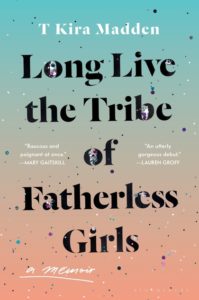 T Kira Madden, Long Live the Tribe of Fatherless Girls
T Kira Madden, Long Live the Tribe of Fatherless Girls
Bloomsbury, March 5
No Tokens editor-in-chief, teacher, and—as she notes in her author bio—amateur magician Madden’s first book is an affecting, clear-eyed memoir about her childhood as a queer, biracial daughter of loving but often drug-addicted parents in Boca Raton, and her journey towards self-knowledge and self-appreciation. You may have read the scintillating excerpt she published in Guernica. I assure you that the rest of the book does not disappoint. Man, can Madden write a sentence. (ET)
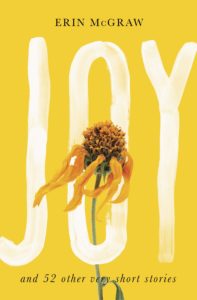 Erin McGraw, Joy: and 52 Other Very Short Stories
Erin McGraw, Joy: and 52 Other Very Short Stories
Counterpoint, March 5
There’s something immensely satisfying about a very short story (particularly one that bills itself as a “very short story” rather than “flash fiction”), and I’m looking forward to a whole collection of them. The stories’ narrators include “the impulsive first-time murderer, the depressed pet sitter, the assistant of Patsy Cline, the girlfriend of your husband,” and based on the other stories I’ve read of McGraw’s, I have high hopes for both humor and devastation. (JG)
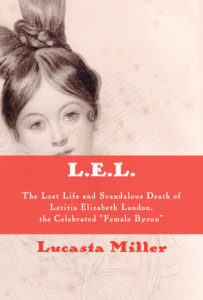 Lucasta Miller, L.E.L: The Lost Life and Scandalous Death of Letitia Elizabeth Landon, the Celebrated “Female Byron”
Lucasta Miller, L.E.L: The Lost Life and Scandalous Death of Letitia Elizabeth Landon, the Celebrated “Female Byron”
FSG, March 5
Letitia Elizabeth Landon was one of the most well-known writers of her time, publishing multiple volumes of poetry and several novels throughout the 1820s and 30s–many of which addressed while becoming a well-known figure in literary London circles. Miller’s heavily-researched book follows Landon through her literary ascent and to a mysterious end, offering a new, nuanced look at a legend. (CS)
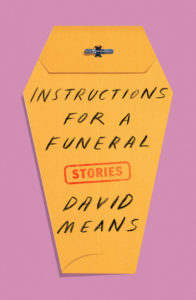 David Means, Instructions for a Funeral: Stories
David Means, Instructions for a Funeral: Stories
FSG, March 5
I’m a big fan of Means, and his short stories are the perfect vehicle to appreciate his perfect blend of violence and humor. (EF)
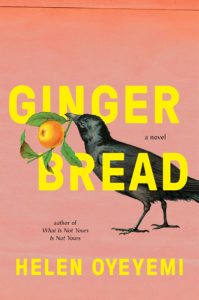 Helen Oyeyemi, Gingerbread
Helen Oyeyemi, Gingerbread
Riverhead, March 5
2019 already looks like a great reading year, not least of all because Helen Oyeyemi will be gracing the world with a new novel. Gingerbread looks set to bring more of her inventiveness and wit to a fairytale element—gingerbread, of course—that holds a mysterious place in children’s literature. The novel tells the story of Perdita and Harriet Lee, a daughter and mother who live in a gold-painted apartment with talking plants and make a kind of gingerbread that was extremely popular in Druhástrana, Harriet’s far-away (or imaginary, depending on who you ask), native land. I’m sold, as I’m sure all of Oyeyemi’s fans are as well. (MK)
 Lisa See, The Island of Sea Women
Lisa See, The Island of Sea Women
Scribner, March 5
The newest novel from the bestselling author of The Tea Girl of Hummingbird Lane is a compelling multigenerational saga, set on a small Korean island, home to a matriarchal society where the women work the sea, diving for food, and the men care for the children. But the core of the novel is the story of two best friends who come from very different families, and whose bond will be tested time and time again over the years. (ET)
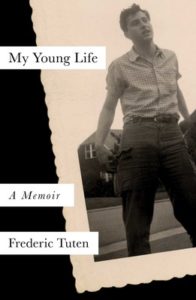 Frederic Tuten, My Young Life
Frederic Tuten, My Young Life
Simon & Schuster, March 5
From a squint, Frederic Tuten appears to have been born lucky. Teaching writing with Paul Bowles in Morocco. Rubbing shoulders with some of the great Latin American muralists of the mid-century. Co-writing the cult film, “Possession.” In the 1960s and 1970s his stories appeared in “The New Yorker” like miniature cataclysms of nerve. He hasn’t stopped, his most recent story won an O. Henry six decades into his life as a writer. Yet he came from somewhere and this exquisitely plain-spoken memoir recalls his childhood in the Bronx, the inevitable but still unlikely migration to Greenwich Village, and the way books and the people who wrote them well cracked open his world. Djuana Barnes, Malcolm Lowry. He tries and fails to become a painter, but he develops a talent for friendship and restlessness instead, and it shows in how he wears his developing self lightly, like a borrowed coat. He falls in love over and again and is crushed like a cigarette after each affair. Some people with big lives get that way through appetites; others by being intensely receptive to what’s possible. Tuten is the later kind of man, and in writing his early life he turns what could be an act of narcissism—speaking of himself—into one of sparkling generosity. (JF)
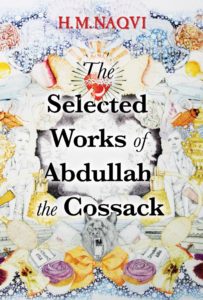 H. M. Naqvi, The Selected Works of Abdullah the Cossack
H. M. Naqvi, The Selected Works of Abdullah the Cossack
Black Cat, March 12
In the supernova of Pakistani talent that burst into view over the last two decades, from Mohsin Hamid and Kamila Shamsie to Nadeem Aslam and Daniyal Mueenuddin, H. M. Naqvi has always been an outlier who’d probably like to keep it that way. His 2009 DSC-prize winning Homeboy was a zooming, energetic counterpunch to so many perspectives of Pakistani’s post 9-11. The picaresque tale turns sour when its hero, Chuck, winds up jobless when the towers come down. It’s a lot harder for Chuck to maintain his bravado in bad times. Chuck’s voice was so vivid—one part Cheech and Chong, another part Ghostface Killah—it’s been hard to imagine where Naqvi would go next. The Selected Works of Abdullah the Cossack is the gorgeous, utterly original answer. In Karachi an aging bachelor son of a once-grand family inherits a ward. What follows is a family farce like no other, one where the vices of familial greed run up against an unexpected source of strength in a man who has dedicated his life to the cavalier arts: love. (JF)
 Cara Robertson, The Trial of Lizzie Borden
Cara Robertson, The Trial of Lizzie Borden
Simon & Schuster, March 12
You probably know the creepy children’s rhyme. Maybe you’ve also read the fictionalized accounts or seen the movies or even taken a tour of the house itself. If that’s the case, you probably want to check out this examination of the infamous murder trial and the rumors surrounding it. Piecing together courtroom transcripts, local newspaper accounts, and even letters from Lizzie Borden herself, Cara Robertson picks at this bit of American myth in a way that might satisfy your morbid curiosity. (KY)
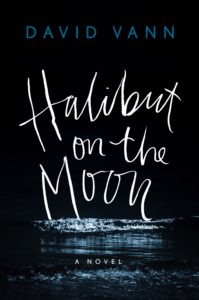 David Vann, Halibut on the Moon
David Vann, Halibut on the Moon
Grove Press, March 12
Halibut on the Moon is a story of one man’s journey home, mental illness, and the things that tether us to one another. With playful and disorienting language, David Vann has created a painful reimagining of the end of his own father’s life. (KY)
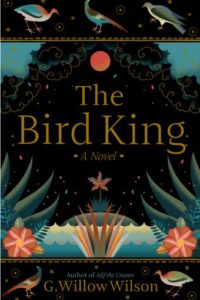 G. Willow Wilson, The Bird King
G. Willow Wilson, The Bird King
Grove, March 12
If you loved Wilson’s Alif the Unseen and have been wondering where she’s been since then, the answer is: writing for the excellent and necessary comic Ms. Marvel. And also, apparently, writing The Bird King, a fabulist novel set during the Spanish Inquisition, in which a young slave comes into her own. Thank goodness. (ET)
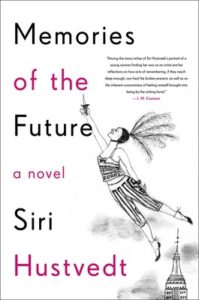 Siri Hustvedt, Memories of the Future
Siri Hustvedt, Memories of the Future
Simon & Schuster, March 19
I very much loved Siri Hustvedt’s last essay collection A Woman Looking at Men Looking at Women, and though it’s not quite right to call the widely honored and much loved author of 16 books “underrated” Hustvedt ought to pop up more often in our idle holiday conversations about “best living writers.” Though I came to Hustvedt through her nonfiction, I’m very much looking forward to Memories of the Future, an “elaborately structured, intellectually rigorous, urgently paced” novel of “memory, desire, and the imagination.” (JD)
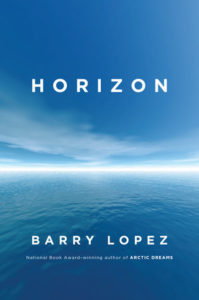 Barry Lopez, Horizon
Barry Lopez, Horizon
Knopf, March 19
Ever since he won the National Book Award in 1986 for Arctic Dreams, his transcendentally beautiful book about the arctic circle, landscape and imagination, Barry Lopez has been working on another book. It was always meant to grapple with the human capacity for violence, how journeying has so often married wonder with destruction, yet how necessary travel remains to fathoming the ways we are different. Thirty-some years and millions of miles later that book has at last arrived and none to soon. In our current state of environmental catastrophe, Lopez feels a bit like an American Virgil, one who can go above and below at the same time, leading us from sights of tremendous hope and peace, from the real to the dreamed. “Anthropologists and archaelogists I’ve asked speculate that in winter the Thule people slept for hours on end,” he writes from Skaerling in Greenland, before bedding down one night. “Conceivably these long slumbers opened up large dreamscapes, which might have functioned for them like the cycles of myths they listened to in difficult times from an isumataqor an angakkuq (shaman).” Lopez never puts himself in front of such forms of knowledge, or grades them against others: he simply brings them to us, and in so doing has managed to fashion his own kind of travel literature, one which doesn’t merely report from distant places, but enlarges by refusing to place a center to the world. In his pages, through his journeys, the center is always the horizon. By staring at it—alongside many other people from places a long ways from his own Oregon—Lopez shows us what we gain when we respect the enormity of what we don’t know, and also what we’d lose were we to erase nature’s ways of knowing. (JF)
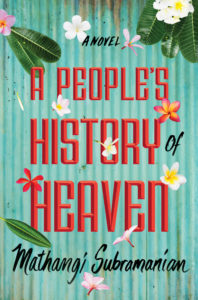 Mathangi Subramanian, A People’s History of Heaven
Mathangi Subramanian, A People’s History of Heaven
Algonquin, March 19
Heaven is a thirty-year-old slum in the growing city of Bangalore, and home to five best friends, a diverse group of girls who will band together to fight against the government who wants to wipe their home off the map and replace it with homes for rich people. (ET)
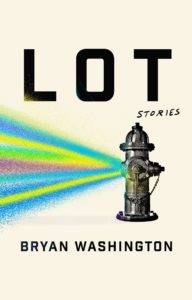 Bryan Washington, Lot
Bryan Washington, Lot
Riverhead, March 19, 2019
Author Bryan Washington, a Houston native, has written about the city extensively, turning his journalistic eye on the many stories it holds. In his debut collection, Washington keeps a narrative spotlight on Houston, exploring the lives that make up its many communities with captivating prose. (CS)
 Claudia Rankine, The White Card: A Play
Claudia Rankine, The White Card: A Play
Graywolf, March 19, 2019
From the author of the genre-bending cultural milestone Citizen: An American Lyric now comes a play about the urgency of recognizing systemic racial constructs. The White Card, which play made its world premiere earlier this year with the American Repertory Theater in Boston, questions the role of whiteness as the presupposed “norm” in our society and exposes what harms are wrought when whiteness is invisible. (CS)
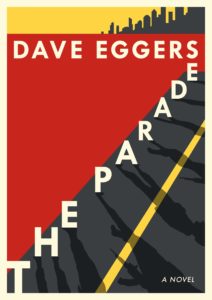 Dave Eggers, The Parade
Dave Eggers, The Parade
Knopf, March 19
The McSweeney’s founder, Dayton Literary Peace Prize-winner, and prolific author of A Heartbreaking Work of Staggering Genius, The Circle, and Heroes of the Frontier is back with another politically charged work; this time an intriguing-sounding allegorical novel about two foreign contractors sent to an unnamed, recently war-torn country to finish the armistice-commemorating highway designed to connect the opposing halves of the state. (DS)
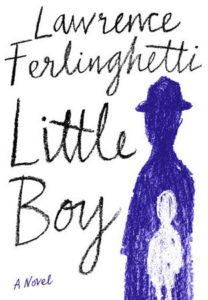 Lawrence Ferlinghetti, Little Boy
Lawrence Ferlinghetti, Little Boy
Doubleday, March 19
Publisher-poet Lawrence Ferlinghetti’s next book, due out less than a week before his 100th birthday, has been dubbed a “closing statement” on an almost impossibly fecund life, and an energetic take on what the near future might hold in store for the rest of us. Perhaps it’s odd that I’ve always found Ferlinghetti to be one of the most interesting figures associated with the Beat Generation—he was and continues to be a reticent cultural gatekeeper, an unassuming curator. Little Boy will be most interesting for its biographical reflections, I imagine, but I’d be lying if I said I wasn’t excited to see some fresh Ferlinghetti-an stylistic bursts. Punctuation be damned! (AR)
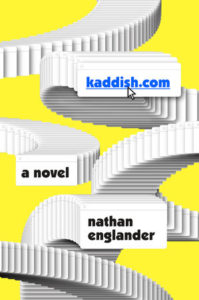 Nathan Englander, kaddish.com
Nathan Englander, kaddish.com
Knopf, March 26
I recently reread Englander’s short story collection What We Talk About When We Talk About Anne Frank, and was reminded of how skilled he is at creating moments of incredible truth, and at writing morality without moralizing. Englander is deft at quiet inner conflict, and this novel—about an atheist in a family of Orthodox Jews who attempts to outsource his mourning of his father—sounds like it plays to his considerable strengths. (JG)
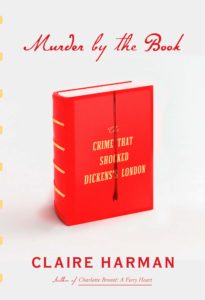 Claire Harman, Murder by the Book: the Crime that Shocked Dickens’s London
Claire Harman, Murder by the Book: the Crime that Shocked Dickens’s London
Knopf, March 26
What’s better than a literary work of true crime? A literary work of true crime about a literary crime, of course! Claire Harman understands how to weave a tale true to life so that it reads like a thriller, and this tale of murder by book in Victorian England promises not to disappoint. (MO)
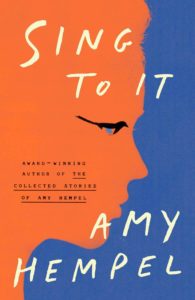 Amy Hempel, Sing to It: Stories
Amy Hempel, Sing to It: Stories
Scribner, March 26
Amy Hempel writes with so much poise and elegance it’s tempting to shove the word classic into a wall and stack her books on that high shelf. Who else has rendered the retraction of love’s blade in such simplicity? Which American writer has lived across so many different trends and continued to sound only like herself? Joy Williams? Toni Morrison? Deborah Eisenberg? The list is very short. In the wake of her Collected Poems, an appearance by Hempel in one journal or another has been like seeing a falling star on an otherwise busily lit universe. Always been worth it. If you don’t believe me, follow this link to the title story, which, in thirteen lines, tells you all you’ll ever need to know about love. Some of the other tales in “Sing to It” take a lighter approach to living, all of them are longer, but they never take their eye off on the scale of what it means to breathe in, then push air out in words, sometimes song. (JF)
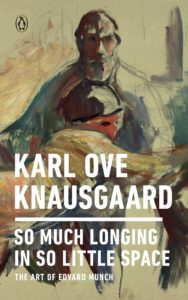 Karl Ove Knausgaard, tr. Ingvild Burkey, So Much Longing in So Little Space
Karl Ove Knausgaard, tr. Ingvild Burkey, So Much Longing in So Little Space
Penguin, March 26
The man has a compulsion—it’s the only way to explain this kind of literary output. Knausgaard’s latest work to be translated into English is ostensibly a study of the art of Edvard Munch, but of course is also a book about Knausgaard himself, and how it feels to consider Munch’s art, and even curate it, as he was asked to do for the Munch Museum. So it becomes a book about subject and author both, and should be interesting to any who enjoy the work of either. (ET)
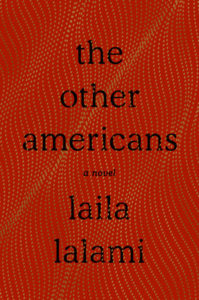 Laila Lalami, The Other Americans
Laila Lalami, The Other Americans
Pantheon, March 26
The follow-up to her widely-acclaimed 2015 novel The Moor’s Account, Laila Lalami’s The Other Americans centers on the death of Driss Guerraoui, a Moroccan immigrant in California who is killed one night after being struck by a speeding car. It’s a mystery story set between the old and the ostensibly new, the “old country” and the United States, where the answers to our most urgent questions are often not forthcoming. It’s all too easy, unfortunately, to note the similarities between Lalami’s premise and real-world instances of violence, from the death of Heather Heyer in Charlottesville to the murder of Idy Dienec, a Senegalese immigrant to Italy shot in Florence earlier this spring. (AR)
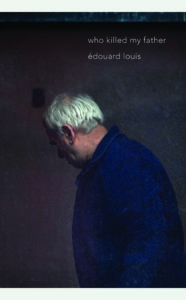 Édouard Louis, tr. Lorin Stein, Who Killed My Father?
Édouard Louis, tr. Lorin Stein, Who Killed My Father?
New Directions, March 26
Growing up in a village in the north of France, Edouard Louis lived under a code of masculinity neatly summarized by his own father. “[B]e a man, don’t act like a girl, don’t be a faggot.” Louis’ breathtakingly brilliant debut, “The End of Eddy,” told the cost of trying to live by that code while growing up gay. It also revealed what demons of contempt crept into his heart when he’d moved to Paris, gone to school, and rebuilt a self against its violence. Faced with the opportunity to look back on his upbringing with scorn, Louis instead chose a regretful, vulnerable kind of love. One of the most moving parts of that novel was the complex portrait Louis painted of his father, a laborer who worked his body into early retirement, who never saw a second self in the media, a working-class man intimidated to the point of fear by his son’s growing intellect. In this book Louis’s father takes center stage, and his is a brutal, heart-breaking tale. Louis effectively argues his fathers life is a case of economic homicide in slow-motion. First his father’s back is mangled at work, then under Sarkozy Louis’ father loses unemployment benefits which guide him into yet more menial work. Finally, under Macron, a measly five euros is taken from his benefit, while the rich are given enormous tax breaks. In the middle of our monstrous second gilded age, this book is a tour-de-force of political writing: another reminder that obscene profits always come from the bodies of the unseen. (JF)
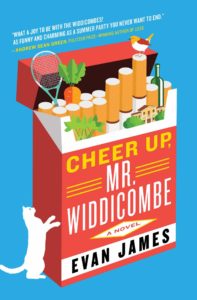 Evan James, Cheer Up, Mr. Widdicombe
Evan James, Cheer Up, Mr. Widdicombe
Simon & Schuster, March 26
I have heard Evan James read his work before, and I can’t think of a writer better equipped to write a contemporary comedy of manners. The novel is an over-the-top satire about a one summer in the life rich family, and though I find my appetite for the foibles of the hyper-wealthy somewhat dulled these days, I’m willing to bet James’ deft wit and generosity will make this one worth your while. (JG)
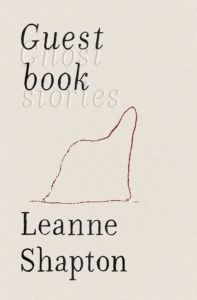 Leanne Shapton, Guestbook: Ghost Stories
Leanne Shapton, Guestbook: Ghost Stories
Riverhead, March 26
It’s fun to speculate about things we can’t explain. It’s fascinating to see what happens when we try to tell stories we don’t quite have words for. That’s why Leanne Shapton’s Guestbook—comprised of vignettes, photographs, and original paintings—is the perfect medium (get it?) for these ghost stories. (KY)
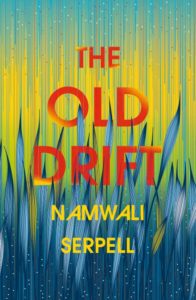 Namwali Serpell, The Old Drift
Namwali Serpell, The Old Drift
Hogarth, March 26
I first encountered the brilliant Namwali Serpell at the 2017 PEN World Voices Festival (on a panel that also featured Jeff VanderMeer, Marge Piercy, and Alice Sola Kim), and when I heard that her novel The Old Drift is coming out in 2019, I got excited before even hearing a thing about it. Now that I know more—it’s an epic, genre-bending tale narrated by a mysterious swarm-like (potentially evil!) chorus, telling the story of a small African nation called the Old Drift and the intertwined lives and conflicts of three Zambian families—The Old Drift‘s cemented its place on my must-read list. If you’re looking for a gripping novel that blends fairytale, romance, and science fiction, and isn’t set in the Western world, this might just be one of the most intriguing things you’ll read all year. (MK)
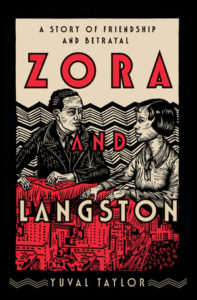 Yuval Taylor, Zora and Langston: A Story of Friendship and Betrayal
Yuval Taylor, Zora and Langston: A Story of Friendship and Betrayal
W. W. Norton, March 26
For those of us delighted by and endlessly interested in the stormy relationship between Zora Neale Hurston and Langston Hughes, two towering literary figures and leaders of the Harlem Renaissance, comes this volume, a detailed unpacking of their lives, loves, and grievances. Who doesn’t love a little literary gossip? Even decades old, it’s still good. (ET)
Emily Temple
Emily Temple is the managing editor at Lit Hub. Her first novel, The Lightness, was published by William Morrow/HarperCollins in June 2020. You can buy it here.



















